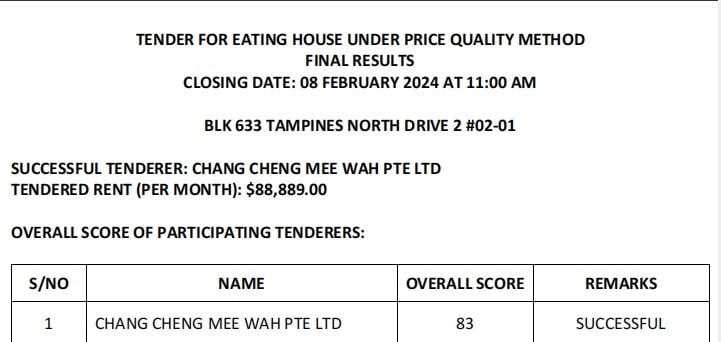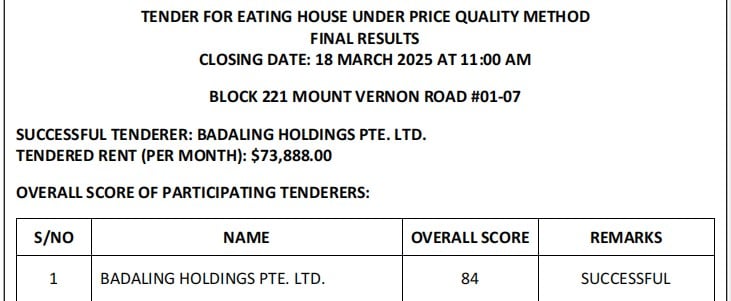SINGAPORE: Veteran food critic and hawker culture advocate KF Seetoh has sharply criticised Singapore’s Housing and Development Board (HDB), accusing it of fuelling unsustainable coffee shop rents in HDB estates that worsen the rising cost of living.
In a Facebook post on 19 September, Seetoh, founder of Makansutra, called for a “serious rethink” of rental policies, arguing that HDB had become “complicit in raising the cost of living” by enabling coffee shop sales and tenders to reach staggering figures.
He cited HDB data showing a coffee shop in Bidadari was tendered in March 2025 for S$73,888 per month, while in February 2024 Chang Cheng Mee Wah secured Block 633 Tampines North Drive 2 at a record S$88,889 per month.


“In your diligent quest to collect revenue to help enlarge our national coffers, you happily celebrate coffeeshop rentals of S$60,000, even up to S$80,000,” Seetoh wrote.
Seetoh highlighted how such rents are inevitably passed on to hawkers and consumers through “revenue hungry operators”.
He argued this contradicts government initiatives such as the “budget meals” scheme, which sets a S$3.50 price point, calling the policy “thoughtless” and “unsustainable” in the face of soaring operating costs.
He stressed that hawkers, already facing thin profit margins, are not fully subsidised and cannot sustain losses under imposed price caps.
Instead, Seetoh suggested allowing hawkers to extend affordable meals out of compassion, not regulation.
“They know when to offer cheap and even free meals to the needy,” he added.
Beyond rental costs, Seetoh criticised utility charges at HDB coffee shops, noting gas prices were up to 30% higher than those at National Environment Agency (NEA) hawker centres.
He cited a Bedok hawker paying S$18.50 per unit compared to S$10–11 in an NEA facility, calling the disparity unjustified.
In 2022, then-National Development Minister Desmond Lee cautioned against rent control, warning of unintended consequences
The debate over escalating coffee shop values has been ongoing.
In June 2022, two coffee shops in Yishun and Tampines sold for record highs of over S$40 million each, with one Tampines site fetching S$41.68 million.
These deals stunned the city-state and raised questions about the sustainability of community dining spaces.
In July 2022, then-MP Carrie Tan filed a parliamentary question asking if the Ministry of National Development (MND) had plans to introduce rent control for HDB coffeeshop stalls, to prevent high rental costs from being passed on to consumers.
Responding, then-MND Minister Desmond Lee confirmed that Singapore had more than 770 HDB coffeeshops, with some privately owned and others rented out by HDB.
He defended the existing system, stressing that rent control could reduce incentives for owners to upgrade facilities and improve services.
Instead, Lee pointed to measures such as ensuring a steady supply of coffeeshops, supporting social enterprises like NTUC Foodfare, and expanding hawker centres.
He also highlighted the Price-Quality tender system introduced in 2018, which requires operators to offer budget meals and maintain sustainable rentals.
Lee further noted that HDB has stopped selling coffeeshops since 1998 and now only rents them out. He assured that HDB monitors resale transactions and food prices closely, and would review its policies when necessary to safeguard affordability.
Concerns rise over record-breaking HDB coffee shop rents and impact on F&B operators
In September 2025, former food and beverage operator Khoo Keat Hwee voiced similar concerns related to record-breaking HDB coffeeshop tenders, warning that such bids risk becoming “new rental norms” that push food prices higher across estates such as Tampines North, Punggol, and Bidadari.
He described the trend as “unsustainable” for both residents and business operators.
The impact has not been limited to coffee shops.
A traditional Chinese medicine practitioner recounted losing a bid for a Sengkang shoplot after offering S$4,700 for a 527 square feet unit, only to be outbid at S$14,000 by a dental clinic.
Similarly, in June, a S$52,188 bid for a general practitioner clinic in Tampines prompted Health Minister Ong Ye Kung to describe the sum as “dismaying”.
In response to rising concerns, the Ministry of Health and HDB introduced a Price-Quality Method (PQM) framework in May 2025.
The revised system allocates 70% of tender evaluations to service quality, with only 30% weighted on rental bids, aiming to curb bidding wars and ensure residents’ needs are prioritised.
Broader calls for rental reform
In May, a bakery near Sembawang Road saw a 15% increase in rent, while a cake shop in Siglap faced a jump from S$5,400 to S$8,500—an increase of 57%—which led its owner to shut down.
On 12 June, advocacy group Singapore Tenants United For Fairness (SGTUFF) urged urgent structural reforms, recommending both immediate relief and long-term changes.
Their proposals included pegging rental caps to inflation and reassessing land use policies to prioritise sustainable business operations.
The post KF Seetoh slams high coffee shop rent, criticises HDB for complicit in rising living costs appeared first on The Online Citizen.


